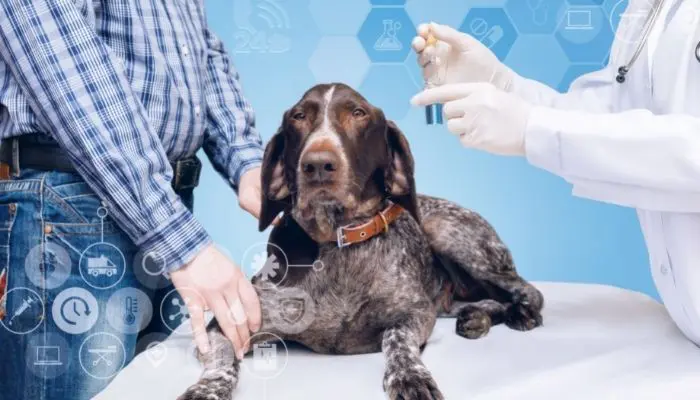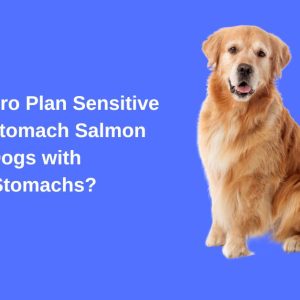The term SIBO stands for Small Intestinal Bacterial Overgrowth. This is a condition in which the small intestine has an excessive amount of bacteria. This bacteria can cause severe symptoms in the dog. It’s also very common in dogs with diabetes, especially Type 1. There are several reasons why this bacteria is so common in dogs with diabetes. One reason is that their pancreas may not be producing enough insulin.

Another reason is that their small intestines may not be absorbing the insulin properly. If they are not getting enough insulin in their bloodstream, they will need to take more insulin to cover their bodies’ needs.
This means that they may have to take larger doses of insulin than they would normally need. These large doses of insulin can cause a lot of problems. The excess insulin can cause problems with their kidneys, liver, and blood sugar levels.
In addition, if they have too much insulin in their bloodstream, it can cause a problem with their fat cells. Their fat cells can become insulin resistant and not absorb the insulin as well. This can cause them to gain weight and even become diabetic again.
Table of Contents
What causes sibo in dogs
SIBO in dogs is caused by bacteria overgrowth in the small intestine. The most common bacteria found to cause SIBO in dogs are Escherichia coli, Enterococcus faecalis, Klebsiella pneumonia, and Streptococcus pneumonia.
The presence of SIBO can lead to a variety of symptoms in dogs, including diarrhea, vomiting, foul-smelling gas, abdominal pain and swelling, and weight loss. Treatment for SIBO usually involves antibiotics to kill the bacteria overgrowth, followed by a period of probiotic therapy to help restore balance to the gut flora. (Read full Article Here)
How is SIBO Diagnosed?
SIBO, or small intestinal bacterial overgrowth, is a condition that can affect both humans and animals. It’s caused by an abnormally high number of bacteria in the small intestine. Symptoms of SIBO include diarrhea, vomiting, weight loss, and flatulence. It can also cause changes in the dog’s behavior, such as depression, aggression, excessive barking, and lack of appetite.
What are the Symptoms?
If you’re wondering whether or not your dog has SIBO, there are several symptoms you should be aware of. These include: a) Vomiting: It’s possible your dog will vomit if he has SIBO. This can be a very serious condition, and you need to get it checked out by a vet as soon as possible. b) Diarrhea: This can also be a symptom of SIBO. It’s usually accompanied by vomiting. c) Weight loss: Your dog might lose weight if he has SIBO.
How to diagnose SIBO: If your dog shows any of these symptoms, it’s time to have him examined by a vet. If you notice any of these symptoms yourself, then you should also get them checked out.
How to treat SIBO: The good news is that SIBO is a relatively easy condition to treat. It can be treated with antibiotics. You should make sure you follow the instructions on the label, and that you don’t give your dog too much at once.
How to prevent SIBO from recurring: There are some ways you can prevent SIBO from recurring. Firstly, you should make sure your dog gets enough water. This will help prevent dehydration. You should also make sure you feed him plenty of high-quality food. And you should have a look at the detailed article on the best dog food for SIBO.
While SIBO is not a life-threatening condition, it can be very painful. It’s best to get it checked out as soon as possible.
What Causes SIBO?
There are several causes of SIBO in dogs. Some of these include:
Food allergies. Certain foods can cause your dog to develop SIBO. These include wheat, dairy, corn, soy and eggs.
Excessive exercise. If your dog is getting too much exercise, it could be causing them to have problems with their digestion.
Stress. Stress can affect a dog’s digestive system.
Medications. Some medications can cause a dog to develop SIBO.
Parasites. Parasites can cause your dog to develop SIBO.
Vaccinations. Certain vaccinations can cause your dog to develop SIBO.
Genetics. Certain breeds of dog are more likely to develop SIBO than others.
Diet. Certain diets can cause a dog to develop SIBO.
Age. Your dog’s age can affect their ability to digest food. If you notice that your dog has problems with their digestion, it’s important to get them checked out by a vet.
Weight. If your dog is overweight, it can affect their digestion.
Exercise. If your dog is not getting enough exercise, it can cause them to have problems with their digestion.
Sleep. Your dog’s sleep patterns can affect their digestion.
Health. Certain health issues can cause your dog to have problems with their digestion. These include:
What Is the Treatment for SIBO?
Step 1: Diet: If your dog is suffering from SIBO, you need to change his/her diet. You have to cut out all the foods that are causing them to have gas.
Step 2: Antibiotics: SIBO is an infection, so you need to treat it with antibiotics. However, there’s a lot of controversy over whether or not antibiotics are effective for treating SIBO. Some Vet feel that antibiotics only mask the symptoms and don’t actually cure the problem. Others think that antibiotics are the only way to treat SIBO.
Step 3: Probiotics: If you’re going to feed antibiotics, you’ll probably also want to feed probiotics. Probiotics are beneficial bacteria that help maintain the good bacteria in your dog
What Are the Side Effects of SIBO?
The main side effect of SIBO is gas and bloating. Gas can be an issue in some dogs. This can happen if there is too much gas in the small intestine. Bloating is also common.
The side effects of SIBO include:
Fatigue
Chronic or recurrent diarrhea
Weight loss
Persistent nausea
Abdominal pain
Loss of appetit
Anxiety
Depression
Insomnia





